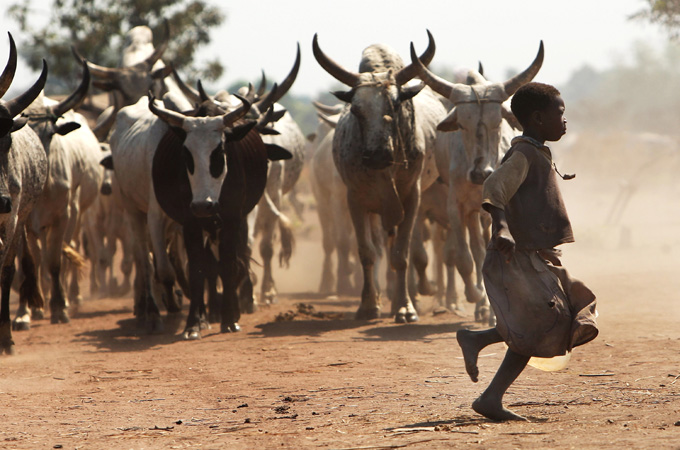
OVERVIEW
MANAGEMENT
PERFORMANCE
POSSIBILITIES
CAPITALS
ACTIVITIES
ACTORS
BURGESS
Trade, Society and Economy |
|
COMMENTARY |
|
Imperialism 2.0: EU fosters Botswana degradation New requirements on beef exports could have a negative ecological impact on the country.
Gaborone, Botswana - Botswana produces some of the highest quality organic, free range beef in the world. Until early last year, the EU was an important destination for this high value product. Then, following a visit by EU veterinary inspectors, new requirements were imposed requiring that all beef exports be traceable to fenced ranches or territories. After over a million USD in expenditures, and a six month self-imposed export moratorium to the EU, the government of Botswana has met these requirements. Unfortunately, these new regulations will almost certainly hasten rangeland degradation in this semi-arid country. Botswana is an African development success story. It was one of the poorest African countries at independence in 1966 with only five kilometres of paved roads and 23 college graduates. The discovery of diamonds a few years after independence, and the astute management of this resource, allowed the country to invest heavily in education, infrastructure and healthcare. These investments, combined with a relatively small national population of about two million people, allowed the country to become one of Africa's most well-to-do. The country has had one of the fastest growing economies in the world over the past 40 years. This rate of growth is comparable to that of the Newly Industrialised Countries (NICs) of East Asia, yet Botswana did this under democratic governance. Today, Botswana has a per capita GDP of $13,100 and eight billion USD in reserves, enough to cover imports for 20 months. The three pillars of its economy are: gem diamond exports (for which it is the world's largest producer), high-end ecotourism and high quality, grass-fed beef production. European eco-imperialism Animal husbandry in the semi-arid regions of Africa has long been organised differently than that of the temperate zones for sound ecological reasons. Herders traditionally ranged widely across the landscape in search of better pastures, focusing on different areas depending on meteorological conditions. The approach worked because, unlike fenced pastures in Europe or North America, it was incredibly flexible and well adapted to variable rainfall conditions. Fenced ranches in semi-arid Africa are problematic because livestock become more concentrated, more vulnerable to drought, and more detrimental to the landscape. The Botswana Meat Commission (BMC), a government parastatal, has played a central role in Botswana's developmental success. By ensuring proper veterinary care, appropriate controls on the spread of foot and mouth disease, fair prices for producers, and sophisticated international marketing, the BMC has ensured that this traditional element of the rural Botswana economy has grown and prospered over time. While Botswana has experienced periodic outbreaks of foot and mouth disease (which often reaches cattle via wildlife populations), the BMC is incredibly meticulous about insuring that beef exports only originate from areas of the country that are completely disease free. While the fencing of ranches is not a new phenomenon in Botswana, the latest EU regulations mean that cattle must be traceable to smaller and smaller areas. This implies that growing quantities of fencing are required and cattle movement is increasingly restricted. The desirability of traceability to such small areas may make sense in a temperate zone, but it is extremely problematic in semi-arid, tropical regions where rainfall and pasture conditions are more variable. Ecological impact? Sceptics wonder if the new EU regulations were really about disease prevention and quality control, rather than protecting European beef producers. If the latter was the intent, Botswana has shown the EU that it could overcome this latest trade barrier in a relatively short amount of time. The real tragedy is that EU regulations are now hastening rangeland degradation in an ecologically fragile part of the world. While EU consumers may think that organic, free range beef implies a product which is better for the environment, they should know that European eco-imperialism, in the form of trade regulations, is incredibly dogmatic, destructive and ignorant of tropical grassland ecology. In this instance, the EU should look anew at the ecological impact of its regulations abroad. A failure to do so is particularly ironic, given European concern for sustainable environmental management in this part of the world. Botswana, for its part, should continue to explore and expand other markets for its beef exports, such as it is doing with South Africa and China. It must also push back against the EU and assert the importance of understanding semi-arid rangeland ecology in the tropics. Botswana has historically prospered when it carefully considers it options, pushes back when it needs to, and does what is best for the long term, sustainable development of the country. This time is no different. William G Moseley is a human-environment and development geographer. He is a professor at Macalester College in Saint Paul, Minnesota, and, currently, visiting scholar in the Department of Environmental Science at the University of Botswana, Gaborone. The views expressed in this article are the author's own and do not necessarily represent al Jazeera's editorial policy. Source: Al Jazeera |
|
Prof William G. Moseley is a human-environment and development geographer at Macalester College in Saint Paul.
Last Modified: 01 Feb 2012 07:22 |
| The text being discussed is available at http://www.aljazeera.com/indepth/opinion/2012/01/2012127131741143676.html |
